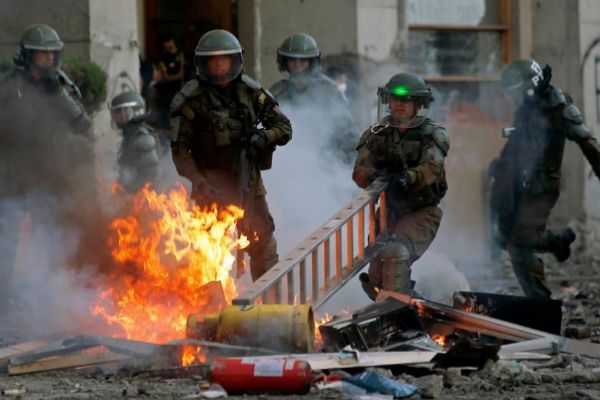- Protests: Fire, looting and incidents in several cities in Chile
- Latin America. Chile burns again on the first day without a state of emergency and after the change of eight ministers
Following the value of the dollar to the minute and fearing inflation is not a Chilean custom, but something very typical of the other side of the Andes, of the Argentines. But that is beginning to change: the political-social crisis unleashed almost a month ago in Chile is threatening the economic health of the country.
The Chilean peso continued to lose value today until it exceeded the 800 dollar barrier, a devaluation of more than 7% so far this week. The price is historical, the Chilean peso was never worth so little.
Analysts point to several factors as reasons for the weakness of the local currency: the continuity and intensification of the acts of violence, the little effect of the announcements of the Government of Sebastián Piñera and the lack of political agreement between the main parties. To this is added the debate about the need for a Constituent Assembly, as well as the continuity of the trade war between the United States and Chile, which weakens the price of copper, the great currency generator of the Chilean economy.
Alfonso Swett, head of the great Chilean businessmen, today has claimed a social pact and has predicted "a fairly long, prolonged and profound economic crisis" , in addition to the real risk that the country, which has been 20 years of consecutive growth, between " in technical recession. "
The economic analyst Tomás Izquierdo also stressed that the rise in the value of the dollar will generate inflation, since 60% of the consumption basket registered by the price index is imported. "There is a very direct link between prices and exchange rates."
The state of social insurrection that Chile is going through began almost four weeks ago, when a protest by students for a rise in the Santiago metro ticket grew to unexpected levels. A good part of the Chilean capital's subway network was rendered useless, Piñera reacted by giving the military security control and imposing the state of siege and 1.2 million people demonstrated calling for a change.
The balance of four weeks of protests is 24 dead, thousands injured and 201 people who lost all or part of an eye due to the pellets used by the police, the militarized police in the country. There are, in addition, a large number of complaints of human rights violations, from physical abuse to sexual abuse, to assassinations awarded to security forces.
The appearance of Piñera in a message to the country from the Palacio de La Moneda on Tuesday night did not have the effect that the Government expected. The president called for a political agreement, announced the order to prosecute all the violent people who are causing riots, destruction and fires in different Chilean regions and said that citizens would have "the last word" to approve the new Constitution that will replace the sanctioned in 1980 during the dictatorship of Augusto Pinochet .
But the left and center-left opposition has already informed Piñera that the new Constitution requires a Constituent Assembly voted ad-hoc by citizens to write the new norm. Piñera wants to avoid that, because the result of that election is unpredictable today, and argues that the current Parliament, constituted only a year and a half ago, is entitled to draw up the new Magna Carta, which will then be ratified - or not - in a referendum. A group of 230 mayors already announced a plebiscite for the next month in which they aspire to hear the voice of citizenship.
According to the criteria of The Trust Project
Know more- Chile
- U.S
- Sebastian Piñera

